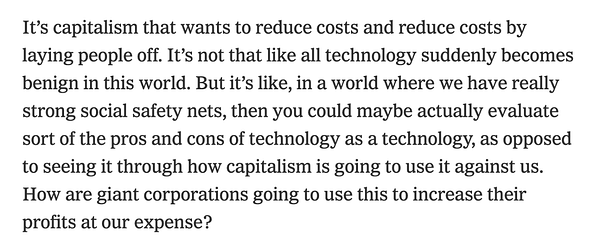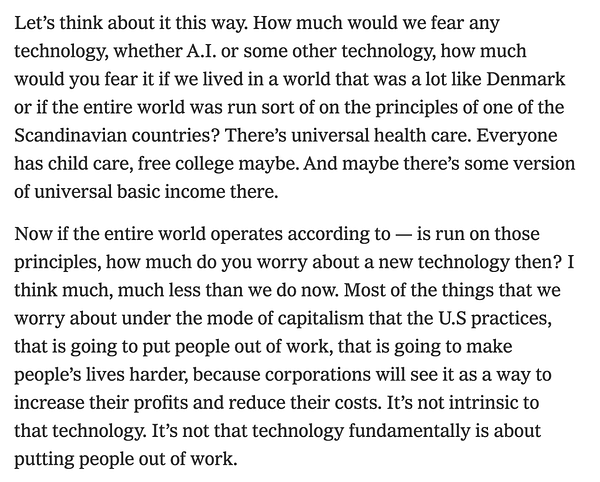The Overview - April 12, 2021
The Overview is a weekly roundup of eclectic content in-between essay newsletters & "Conversations" podcast episodes to scratch your brain's curiosity itch.
Hello Eclectic Spacewalkers,
I wish that you and your family are safe and healthy wherever you are in the world. :)
Check out the last The Overview - April 05, 2021: HERE
Get our E-Book for free by using ‘substack’: HERE
—
Below are some eclectic links for the week of April, 12th, 2021.
Enjoy, share, and subscribe!
Table of Contents:
Articles/Essays - Wendell Berry via Simon Sarris, Project Syndicate, World Resources, Commonweal Magazine, Brookings Institute, Science Mag Books, Discourse Mag, Protocol, Science Magazine, and Slate
Book - To save everything click here by Evgeny Morozov
Documentary - Hacking Your Mind by PBS
Lecture - "The Surrender of Culture to Technology" - Neil Postman
Paper - Pluralistic Ignorance Research in Psychology: A Scoping Review of Topic and Method Variation and Directions for Future Research via Rikki Sargent
Podcast - The Side View Episode 21: Media Ecology and The McLuhan Institute w/ Andrew McLuhan; EP117 SamoBurja on Societal Decline via The Jim Rutt Show
TED Talk - The secret to changing negative self-talk by renewing your mindset | Bruce Pulver | TEDxFlowerMound
Twittersphere - Author Ted Chiang on how most fears about technology are really fears about capitalism
Video - NEW PHYSICS JUST DROPPED - Why the Muon g-2 Results Are So Exciting! Via @PBSspacetime; Muon g-2 experiment finds strong evidence for new physics via @Fermilab
Website - Antipodes.com
Articles/Essays
The Work of Local Culture An essay by Wendell Berry via @simonsarris
“In the woods, the bucket is no metaphor; it simply reveals what is always happening in the woods, if the woods is let alone. Of course, in most places in my part of the country, the human community did not leave the woods alone. It felled the trees, and replaced them with pastures and crops. But this did not revoke the law of the woods, which is that the ground must be protected by a cover of vegetation, and that the growth of the years must return—or be returned—to the ground to rot and build soil. A good local culture, in one of its most important functions, is a collection of the memories, ways, and skills necessary for the observance, within the bounds of domesticity, of this natural law. If the local culture cannot preserve and improve the local soil, then, as both reason and history inform us, the local community will decay and perish, and the work of soil-building will be resumed by nature.”
—
The Case for Open Land-Data Systems via @TimHanstad in @ProSyn
“Finally, systems should be fit for purpose and context. Current technological possibilities alone should not dictate the design of open land-data systems. Instead, governments should establish their goals and priorities, and create an open land-data system to fulfill their needs. It is also important to recognize that context matters – what works in one setting may not work in another.
To be sure, open land-data systems are no magic bullet. They guarantee neither transparency nor accountability. But forward-thinking governments should embrace these systems as crucial tools in the process of stamping out corruption and safeguarding the land rights of all members of society.”
—
Photo Essay: Poor Communities in Surat, India, Take Climate Resilience into Their Own Hands via @WorldResources
“Many city residents fear climate extremes, but their resilience capacities vary based on gender, age, income and social resources. To help better understand how to build resilience, WRI assessed several neighborhoods using the Urban Community Resilience Assessment (UCRA) tool, developed with support from Cities Alliance’s Joint Work Program on Resilient Cities. Learn more in our recent research paper,Prepared Communities.
The UCRA helps city planners understand the nature of climate vulnerabilities in poor, urban neighborhoods and their means to adapt to them. The tool can benefit cities in four ways: 1) to tailor early warning systems to meet the needs of vulnerable people; 2) map service gaps in vulnerable neighborhoods; 3) inform long-term resilience planning and build climate-resilient infrastructure; and 4) promote a culture of inclusive planning.”
—
Minds Without Brains? The promise and peril of artificial intelligence via @commonwealmag
“But not everyone is so certain that a strong AI, capable of reason, would be conscious in the way we consider ourselves to be. Like David Chalmers, the AI specialist Susan Schneider, author of Artificial You, draws a distinction between intelligent behavior and the kind of consciousness brains produce. Schneider has a PhD in philosophy from Rutgers and was a fellow at Princeton’s Center for Theological Inquiry. She now runs the Center for the Future of the Mind at Florida Atlantic University, where she and her colleagues are building a robot lab. “I think we need to distinguish between consciousness and intelligence. We could in principle create highly intelligent machines that are not conscious,” she told me by phone. “Think about the human brain. Much of the brain’s activity is unconscious computation. We know sophisticated mental processing can happen without consciousness. And we can also see from the developments in AI that there’s impressive development in machine learning—moving toward a more general form of intelligence. And these algorithms are not exactly like what the brain is doing.” Schneider mentions the computer Go champion as an example. “That algorithm does not process the game the way we would. So I would not assume at all that machines would be conscious. We need to be sensitive to that distinction.”
—
It is time to restore the US Office of Technology Assessment via @darrwest in @BrookingsInst
“To summarize, the federal government would benefit from a sustained and systematic effort to compile data, analyze problems, and make recommendations on technology policy. Legislators have lacked an organized entity for the last 25 years—and public policy has suffered as a result. Bringing back a reconstituted U.S. Office of Technology Assessment would offer an organizational mechanism to address tech problems and provide legislators with up-to-date information on this vital sector. With problems ranging from worker impact, ethics, and bias to human safety, inequality, and governance, it is time to restore this organization and provide guidance over the technology sector. This type of entity can play a vital role in charting an informed path for the future of U.S. technology policy.”
—
The counterculture icon @stewartbrand continues to embrace an outside-the-box approach to the future via @LeapingRobot in @SciMagBooks
“At the heart of all of Brand’s activities is his profound desire to encourage people to see the world in new ways. The film’s core idea as well as its title is drawn from the introductory pages of the Whole Earth Catalog: “We are as gods and might as well get good at it.” This message, an alloy of hope and hubris, revolves around the idea that the right tool, be it the psychedelic LSD or a clock built to last 10,000 years, can “concentrate consciousness,” alter our perception, and inspire new behavior.”
—
Innovation is a Geographically Localized and Temporary Phenomenon via @mattwridley in @Discourse_Mag
“It’s also a strangely localized and temporary phenomenon. At any one time, there is usually one part of the world where innovation flourishes best, attracting talent from all over: California in 1960, the U.S. East Coast in 1920, Britain in 1800, Holland in 1650, Renaissance Italy in 1500, Song China in 1000, Abbasid Arabia in 800, ancient Greece in 500 B.C., the Ganges Valley before that. These were places that were relatively wealthy, free and open to trade at the time.”
—
Big Tech defenders dominate the country’s top group of antitrust lawyers via @issielapowsky in @protocol
“Whatever the reason, the largest tech companies, which pose the most pressing antitrust questions of the day, are noticeably shaping recent conversations within the ABA's antitrust section. The group held its virtual spring conference last week, featuring a range of lawyers from firms representing tech companies and representatives from the companies themselves, according to a schedule obtained by Protocol. Antara Dutta, Amazon's principal economist, chaired a session called "Consumer Protection for Diverse Communities," which included Facebook policy head Pedro Pavón. Anant Raut, Facebook's global head of competition policy, co-moderated a panel called "Hot Topics." And Google's vice president of government affairs, Markham Erickson, participated in a panel on tech firm conduct.”
—
Study finds nowhere on Earth is safe from satellite light pollution via @ScienceMagazine
“In 1979, the International Astronomical Union suggested astronomical observatories should be built only where light pollution adds less than 10% more light over natural skyglow; the new study suggests nowhere on the planet meets those standards anymore.
What matters most for this kind of research is not just the amount of added background glow, but how it varies across the globe—neither of which has yet been actually measured, says Mireia Montes, an astronomer at the Space Telescope Science Institute. A variable airglow would be difficult to subtract out. But, “If it’s uniform, it’s OK,” she says. “You just put more time in, and your images end up being more expensive.”
—
How the Stories We Tell About COVID Can Help—or Hinder—Vaccination Efforts; A year into the pandemic, a powerful “folklore” has already taken hold. via @slate
“What kinds of tales will you tell, 30 years from now, about what COVID was like? What kinds of COVID stories are people already telling today, and how are those stories affecting their choices, inside this pandemic—the choice to get vaccinated or not, the choice to wear a mask or not?
Andrea Kitta, a folklorist who wrote a book called Vaccinations and Public Concern in History, studies the evolution of the stories that people tell one another about medicine, diseases, and vaccines. Kitta is now working on collecting COVID folklore, through interviews and lurking in comment sections, to find out which stories about the disease—and about the COVID vaccine—are sticking with people.”
Book
To Save Everything, Click Here: The Folly of Technological Solutionism by @evgenymorozov
This book completely changed my life. It upended the technological solutionism paradigm that I was inhabiting, by giving counterfactual examples and incredible honesty in drawing out both the pros and cons of each technology is reviewed. The author, Evgeny Morozov, is sorta a de facto hero of ours in his trajectory of writing books and eventually creating The Syllabus.
Xiii - “The ultimate goal of this book, then, is to uncover the attitudes, dispositions, and urges that comprise the solutionist mind-set, to show how they manifest themselves in specific projects to ameliorate the human condition, and to hint at how and why some of these attitudes, dispositions, and urges can and should be resisted, circumvented, and unlearned. For only by unlearning solutonism--that is, by transcending the limits it imposes on our imaginations and by rebelling against its value system--will we understand why attaining technological perfection, without attending to the intricacies of the human condition and accounting for the complex world of practices and traditions, might not be worth the price.”
Documentary
Hacking Your Mind via @PBS
Have you seen The Social Dilemna? Did you find yourself wondering why the filmmakers were asking the same people who created the addictive business model of social media what solutions they could provide for the problem they created? If you wanted a different option, or an additional option to pair with the Social Dilemna, might we recommend Hacking Your Mind from PBS? After watching this 3-part series you will begin asking yourself: how much of my life is lived on autopilot?
“Hacking Your Mind offers you an autopilot owner’s manual.”
Lecture
College Lecture Series - Neil Postman - "The Surrender of Culture to Technology"
Neil Postman is one of our heroes. Of course, we don’t want to elevate him to idol status, but his books and ideas have fundamentally changed our lives. As technology has overtaken our entire lives in every facet imaginable, Neil Postman was one of the few people making an honest critique of our headlong rush into technological solutionism. Postman claimed that Americans had elevated tech to a national religion, which makes people put too much faith and not enough questioning of the relationship between humans and tech. Our upcoming #13 essay will be on the subject of this topic and of the same book name: Technopoly. (Mentioned in 03/22/2021 The Overview)
Paper
Pluralistic Ignorance Research in Psychology: A Scoping Review of Topic and Method Variation and Directions for Future Research via @RikkiHSargent
“Pluralistic ignorance occurs when group members mistakenly believe others’ cognitions and/or behaviors are systematically different from their own. More than 20 years have passed since the last review of pluralistic ignorance from a psychological framework, with more than 60 empirical articles assessing pluralistic ignorance published since then. Previous reviews took an almost entirely conceptual approach with minimal review of methodology, making existing reviews outdated and limited in the extent to which they can provide guidelines for researchers. The goal of this review is to evaluate and integrate the literature on pluralistic ignorance, clarify important conceptual issues, identify inconsistencies in the literature, and provide guidance for future research. We provide a comprehensive definition for the phenomenon, with a focus on its status as a group-level phenomenon. We highlight three areas of variation in particular in the current scoping review: variation in topics assessed, variation in measurement, and (especially) variation in methods for assessing the implications of individual-level misperceptions that, in aggregate, lead to pluralistic ignorance. By filling these gaps in the literature, we ultimately hope to motivate further analysis of the phenomenon.”
Podcasts
@TheSideViewCo Episode 21: Media Ecology and @McLinstitute w/ @amicusadastra
What a conversation between, hopefully, two future ES Conversations podcast guests! Adam Robbert, of The Side View, talks to Andrew McLuhan of the McLuhan Institute. You might have heard of his grandfather, Marshall McLuhan, or his father, Eric McLuhan for their media studies fame. “The Medium is the Message” being the most iconic line from a family of incredible thinkers. The exchange is great and seems like Andrew has begun to take his family heritage to the next level with what he is doing with The McLuhan Institute.
Count us in as the first future McLuhan apprentices to stay at the intellectual Airbnb!
—
EP117 @SamoBurja on Societal Decline via @jim_rutt
This episode has range because the guest and host have range in their expertise. The amount of topics discussed is easily in the double digits, but what makes the conversation next level is how well everything is weaved into the theme of “civilization.” This episode will make you think, inspire you, and make you question assumptions. Would love to have either of them on ES Conversations in the future.
“Samo Burja talks to Jim about his freely available book, Great Founder Theory. They cover long-lasting societies, theories & limits of history, cultures that prioritize documentation, long-term priorities, institutional organization, social technologies, design vs evolution, what makes a great founder, times of slow change, market reform dynamics, censorship, social coordination costs, social media reformation, centralized vs decentralized declining empires, closed vs open academic journals, pre-registered research, post-modernism, noble lies, technology & society connections, institutional decline, the overproduction of elites, prioritizing functionality & maintaining institutions, psychology’s impact on advertising & culture, live vs dead players, borrowed vs owned power, the succession problem & possible solutions, the dangers of risk aversion, political transitions, and much more.”
TED Talk
The secret to changing negative self-talk by renewing your mindset | Bruce Pulver | TEDxFlowerMound
This is something I have personally had a problem with. Dealing with the pursuit of unattainable perfection, personal insecurities, and stages of imposter syndrome, negative self-talk can crop up easily, and stay longer than you want, if you aren’t careful.
“How is your self-talk? Bruce is obsessed with words. After he was downsized in his career, Bruce had to change his mindset to navigate a new path. Bruce shares why the words you use matter and how changing your words can change your mindset. Bruce teaches how to alter your self-talk and be intentional with your words.”
Twittersphere
Author Ted Chiang on how most fears about technology are really fears about capitalism via @jackiehluo
Videos
Why the Muon g-2 Results Are So Exciting! Via @PBSspacetime
NEW PHYSICS JUST DROPPED
“When a theory makes a prediction that disagrees with an experimental test, sometimes it means we should throw the theory away. But what if that theory has otherwise produced the most successful predictions in all of physics? Then, that little glitch may be pointing the way to layers of physics deeper than we've yet imagined. Well, FermiLabs Muon G-2 experiment has been chasing the most promising glitch of all, and they've just announced their results.”
—
Muon g-2 experiment finds strong evidence for new physics via @Fermilab
Website
Antipodes Map
The Earth Sandwich can be done with the help of Antipodes.com!
From our place in SoCal, our Antipodes location is in the middle of the ocean hundreds of miles off the coast of Madagascar. Check yours out at the link above.
That’s it for this week. Until next time - Ad Astra!
More on Eclectic Spacewalk:
Subscribe to Substack Newsletter
Listen to all podcasts on Anchor
Follow Eclectic Spacewalk on Twitter









